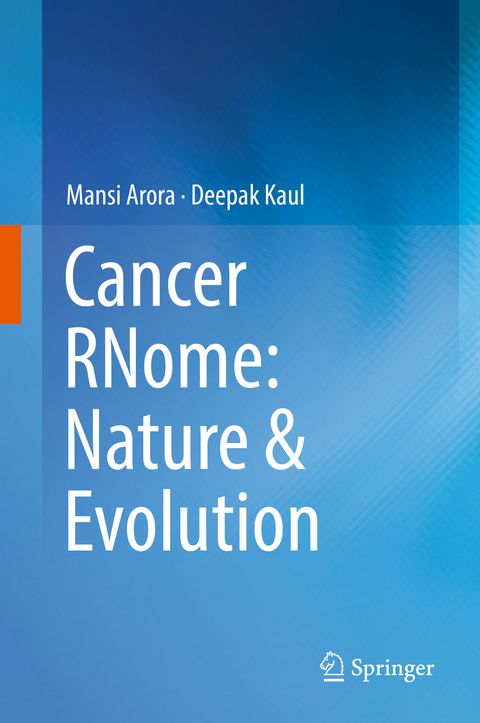
Cancer RNome: Nature & Evolution
Springer Verlag, Singapore
978-981-13-1567-1 (ISBN)
This book encompasses a comprehensive review of the transcriptional landscape of the cell and its involvement in the cancer pathophysiology. The first two chapters elucidate the basics of biosynthesis, mechanism of action and modulation of the epigenetic regulation of gene expression by coding as well as non-coding RNAs. The third chapter discusses the aberrant expression of the cellular RNome in the cancer cells and highlights its role in the orchestration of processes involved in evolution as well as the sustenance of cancer cells. The fourth chapter describes the recent advances in the field of translating the transcriptome into diagnostic/prognostic biomarkers and as targets for novel anti-cancer therapies. The final chapter then reviews the emerging experimental approaches to screen, identify and explore the functions of ncRNAs.
Providing valuable insights into the field of RNome in the context of cancer, this book is helpful to students, researchers and clinicians..
Dr. Mansi Arora is currently working as Assistant Professor in Biotechnology, Government P.G. College, Panchkula, Haryana. She completed her PhD from the Department of Experimental Medicine and Biotechnology, PGIMER, Chandigarh. She has also served as a Demonstrator in the same department. In her relatively short scientific career to date, she has published several papers and has presented work at various leading international/ national conferences and symposia. Dr. Deepak Kaul is former Senior Professor & Head of the Department of Experimental Medicine & Biotechnology, Postgraduate Institute of Medical Education and Research (PGIMER), Chandigarh, India. He completed his PhD at the prestigious All India Institute of Medical Sciences (AIIMS) New Delhi. He is also founder of the Molecular Biology Unit at PGIMER, and has been associated with PGIMER for more than three decades. His main areas of research are molecular medicine, functional genomics, genomic immunity and cancer biology. Dr. Kaul has published over 150 papers, which speaks the volume about his contributions in the field. He is a fellow/member of various respected international societies, such as the Royal College of Pathologists (London); Indian National Science Academy (India); World Academy of Art and Science; International College of Angiology; New York Academy of Sciences; and the Biochemical Society, London. He is on the editorial board of several reputed international journals, including the Journal of Anti-virals & Anti-retrovirals, Word Journal of Cardiology, Leukemia Research, and Molecular & Cellular Biochemistry. He is also an expert member of several Government of India task forces and committees, such as on “RNA-Interference” & “Biology of Infectious Diseases”, Department of Biotechnology, Ministry of Science & Technology, Govt. of India.
1. Section 1. RNome: Evolution and nature.- Chapter. 1.1. RNA world hypothesis.- Chapter.1.2. Various classes of RNAs (coding as well non-coding), their biosynthesis and basic functions.- 2. Section 2. Cellular RNome: Chromatin dynamics.- Chapter. 2.1. Chromatin modifications & transcription.- Chapter. 2.2. RNA modifications and epitranscriptomics.- Chapter. 2.3. Cellular RNome: Contribution of non-coding RNA.- 3. Section 3. Cancer RNome: Evolution and Sustenance.(How is cancer RNome different from RNome of healthy cell? How does the cancer RNome regulate the evolution as well as the sustenance of cancer?).- Chapter. 3.1. Genome instability and mutation.- Chapter. 3.2. Tumor-promoting inflammation.- Chapter. 3.3. DNA methylation addiction.- Chapter. 3.4. Oncoviruses.- Chapter. 3.5. Sustained proliferative signaling.- Chapter. 3.6. Evasion of growth suppressors.- Chapter. 3.7. Replicative immortality.- Chapter. 3.8. Resisting Cell death.- Chapter. 3.9. Invasion and metastasis.- Chapter. 3.10. Angiogenesis induction.-Chapter. 3.11. Deregulated cellular energetics/Molecular sweet tooth.- Chapter. 3.12. Tumor Immune-evasion.- Chapter. 3.13. Cancer stem cells and tumor cell plasticity.- 4. Section 4. Cancer RNome: Therapeutic implications(Translational implications of the cancer RNome). Chapter. 4.1. RNAs as diagnostic/prognostic biomarkers.- Chapter. 4.2. RNAs in cancer therapy & chemo-resistance.
| Erscheinungsdatum | 23.11.2018 |
|---|---|
| Zusatzinfo | 50 Illustrations, color; 1 Illustrations, black and white; XII, 313 p. 51 illus., 50 illus. in color. |
| Verlagsort | Singapore |
| Sprache | englisch |
| Maße | 155 x 235 mm |
| Themenwelt | Medizin / Pharmazie ► Medizinische Fachgebiete ► Onkologie |
| Studium ► 2. Studienabschnitt (Klinik) ► Humangenetik | |
| ISBN-10 | 981-13-1567-1 / 9811315671 |
| ISBN-13 | 978-981-13-1567-1 / 9789811315671 |
| Zustand | Neuware |
| Informationen gemäß Produktsicherheitsverordnung (GPSR) | |
| Haben Sie eine Frage zum Produkt? |
aus dem Bereich


